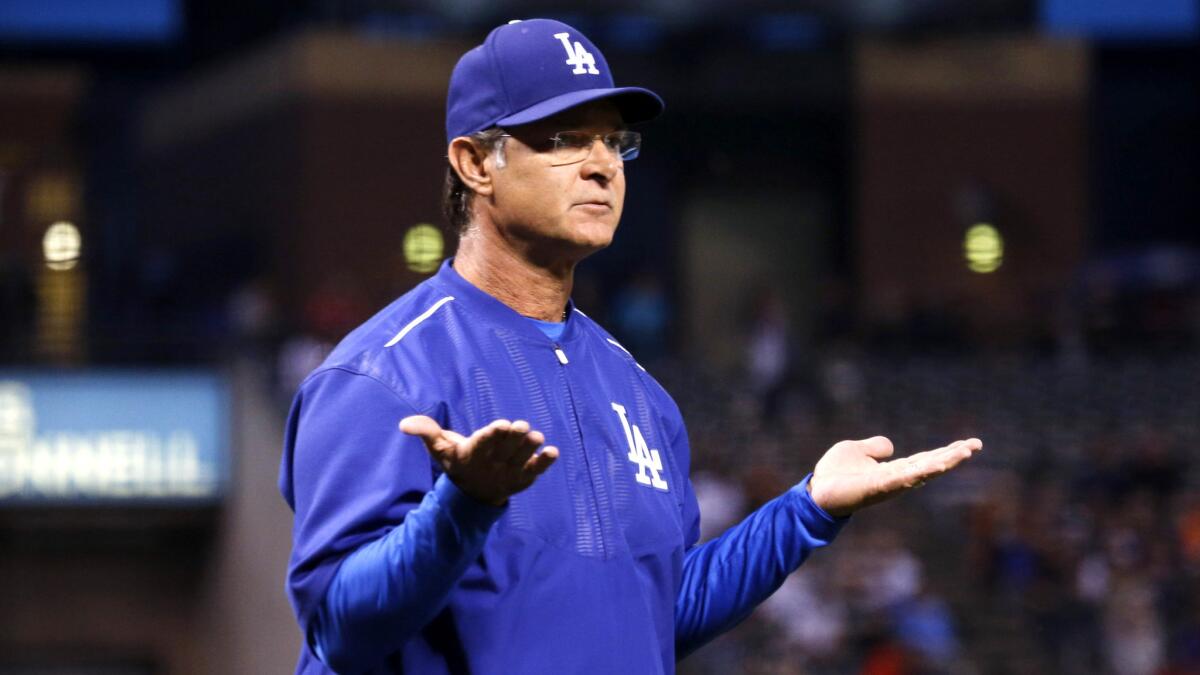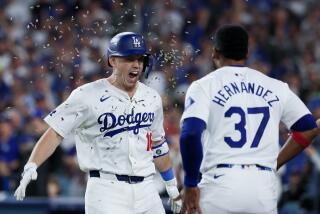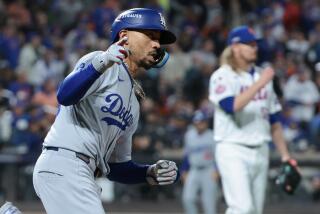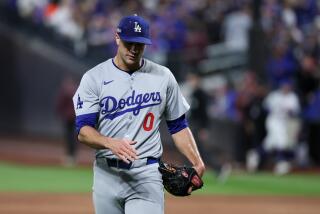Dodgers’ and Mets’ setup situations add to the suspense

When Dodgers Manager Don Mattingly has to pull a starting pitcher before the eighth inning, it’s anyone’s guess if the replacement will actually provide relief.
- Share via
The clock will strike 5. Zack Greinke will take the mound. The Dodgers and New York Mets will play Thursday, with the winning team getting the Chicago Cubs and the losing team clearing out lockers for the winter.
When the clock strikes 7, pay particular attention. What happens in the innings between the starter and the closer might well determine which team advances to the National League Championship Series.
For the Dodgers and Mets, that bridge has been unstable, and under construction, all summer. Although the fan bases might be loath to accept reality, the wondrous bullpen relay team that the Kansas City Royals rode to the World Series last season — Kelvin Herrera in the seventh inning, Wade Davis in the eighth, Greg Holland in the ninth — is an exception to rule.
That rule: Nothing in baseball is more volatile than the performance of relief pitchers.
“When you’re looking at the Kansas City side, they’ve got three power guys,” Mets Manager Terry Collins said. “To find three power guys to be able to do that is an oddity.”
The Dodgers hoped to present a reasonable facsimile by closing with Pedro Baez, Chris Hatcher and Kenley Jansen, three guys who light up a radar gun.
Baez gave up a two-run single to the first batter he faced in Game 1 and did not retire any of the three batters he faced in Game 3.
In Game 4, the Dodgers asked Hatcher to get three outs in the eighth inning — “That’s Hatch’s inning,” Manager Don Mattingly said — and Hatcher got two. That forced the Dodgers to rush in Jansen for a four-out save.
Said Mattingly: “I think every manager in baseball would love to say, ‘OK, here’s where we’re going to go in the seventh, eighth, ninth, and we know it.’ It changes your whole thinking process.
“That doesn’t happen very often.”
In July, the Dodgers traded for a setup man in Jim Johnson, who had 50-save seasons in 2012 and 2013 and a 2.25 earned-run average this season. His ERA was 10.13 for the Dodgers, who left him off the postseason roster and, on Wednesday, designated him for assignment.
The best of the setup men available at the trade deadline appeared to be Tyler Clippard, who said he had his heard name linked with the Dodgers. Clippard closed the regular season by giving up 10 runs in 12 2/3 innings.
In Game 1, the Mets asked Clippard to get three outs in the eighth inning. He got two, and gave up two hits. That forced the Mets to rush in closer Jeurys Familia for a four-out save.
It is difficult to envision a scenario in which the Dodgers and Mets can bypass their setup corps entirely. Jacob deGrom, who starts Thursday for the Mets, made a season-high 121 pitches in Game 1. His career high is 122 pitches; he faced six fewer batters in his next start.
The Mets plan to have starters Noah Syndergaard and Matt Harvey available in relief, for what Collins said would be no more than an inning or two each.
Mattingly said it is unlikely that the Dodgers would use Clayton Kershaw in relief. Greinke, who will start for the Dodgers, worked seven innings in Game 2, on 110 pitches. Greinke made 30 starts during the regular season, only four with more than 110 pitches.
“Just since I’ve been here, the first year in the playoffs with [Brian] Wilson and Kenley, I felt like those were probably as good of eight-nine inning guys as there were,” Greinke said. “Last year, we had a little more issues in the eighth inning.
“This year, I feel like Hatcher’s been pitching pretty amazing as of late. So I feel pretty confident with those last two innings.”
The relief pitcher most frequently deployed by the Mets is not even a relief pitcher, unless Bartolo Colon is starting a second career at 42.
Colon, who made his major league debut in 1997 and won the Cy Young Award for the Angels in 2005, entered postseason play with 485 career appearances, never on consecutive days. He has pitched in each of the past three games in this series, including Monday and Tuesday.
When the Mets want a ground ball for a double play, he’s their guy.
“You’ve got to accept the fact that he’s not a strikeout guy,” Collins said. “When you’re looking at the back end of a bullpen, there are a lot of situations where you need to get a strikeout, but where he’s going to make ‘em swing the bat.”
A setup man on either side could be the most valuable player in Game 5. There might not be a trophy to collect, but perhaps the prize could be a colorful T-shirt, a copy of the one that made its way around the Mets’ clubhouse on the final weekend of the regular season.
On the T-shirt: a picture of the 5-foot-11, 283-pound Colon. Beneath the picture, these words: “Big Sexy.”
Twitter: @BillShaikin
More to Read
Are you a true-blue fan?
Get our Dodgers Dugout newsletter for insights, news and much more.
You may occasionally receive promotional content from the Los Angeles Times.










